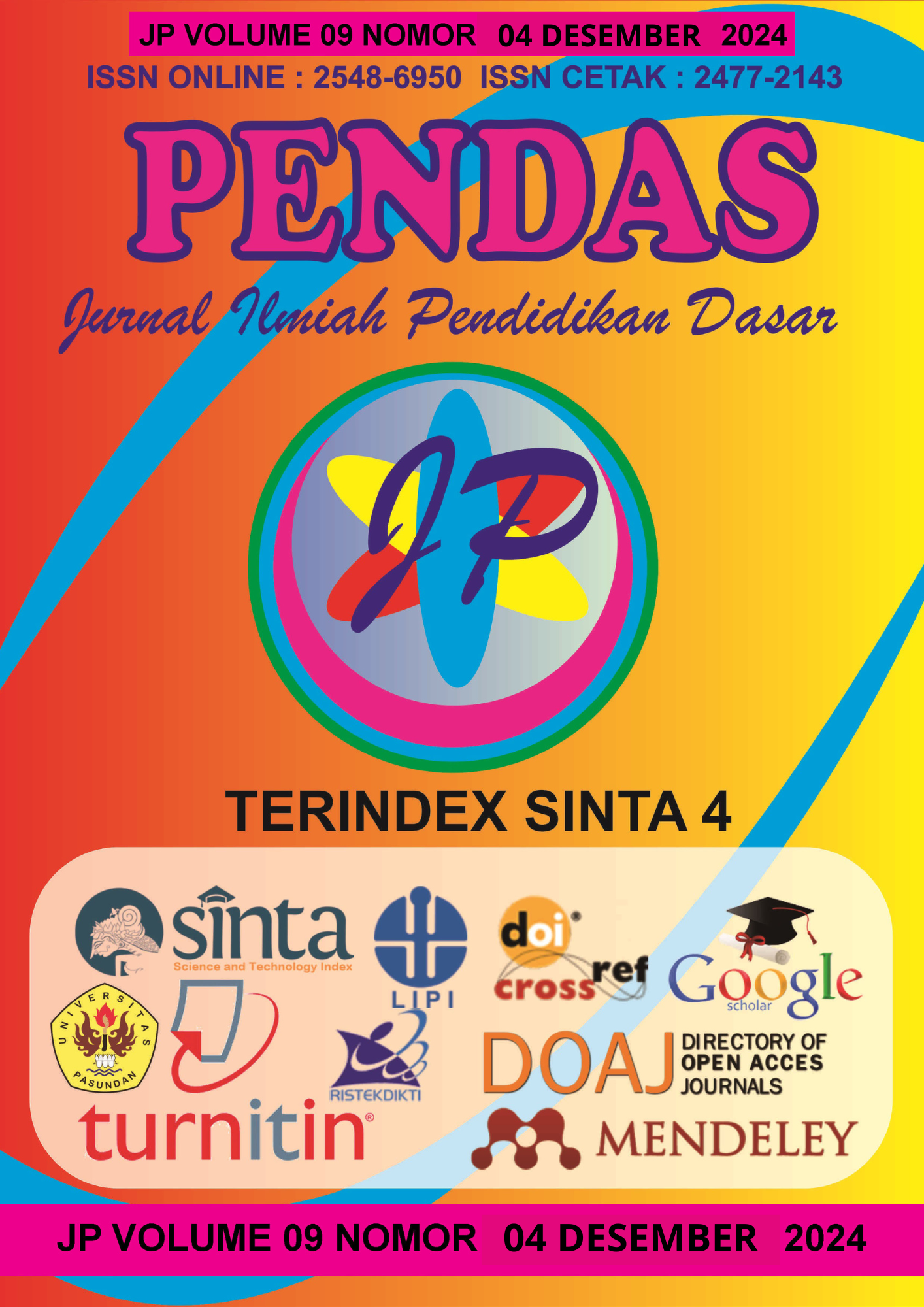PENGASAPAN IKAN DI KENJERAN SEBAGAI PEMBELAJARAN ETNOSAINS SEKOLAH DASAR DAN POTENSI KONTRIBUSINYA PADA SDGs
DOI:
https://doi.org/10.23969/jp.v9i04.21238Keywords:
Pengasapan Ikan, Etnosains, Tujuan Pembangunan BerkelanjutanAbstract
This study aims to (1) examine more deeply the local practice of Fish smoking in Kenjeran, in the context of maintaining local wisdom and building a character of love for the homeland; (2) Link the local practice of Fish smoking in Kenjeran with the global practice of Fish smoking, based on an ethnoscience perspective, and the contribution of these practices to achieving the Sustainable Development Goals/SDGs; and (3) Implement meaningful Elementary School Science learning, through ethnoscience-based learning. Fish smoking in Kenjeran as local wisdom, contains Science concepts that are relevant to the Elementary School curriculum, including changes in the state of matter, heat transfer, and food preservation. The research method uses a qualitative approach with data collection techniques through observation, interviews, and questionnaires. Data analysis was carried out descriptively qualitatively to identify Science concepts in the Fish smoking process in Kenjeran, from the perspective of ethnoscience, Science literacy, glocalization, and SDGs. The results of the study indicate that the local practice of smoking Fish in Kenjeran can be integrated as ethnoscience-based learning to improve the quality of Science learning to be more meaningful for Elementary School Teacher students and Elementary School students. In addition to aiming to maintain local wisdom, the local practice of smoking Fish can also be associated with the perspective of glocalization, Science literacy and can contribute to SDGs point 2 (zero hunger), point 8 (decent work and economic growth), point 12 (responsible consumption and production), and point 14 (life below water).
Peneltian ini bertujuan untuk (1) mengkaji lebih dalam tentang praktik lokal pengasapan Ikan di Kenjeran, dalam konteks menjaga kearifan lokal dan membangun karakter cinta tanah air; (2) Mengaitkan praktik lokal pengasapan Ikan di Kenjeran dengan praktik global pengasapan Ikan, berdasarkan perspektif etnosains, dan kontribusi praktik tersebut pada pencapaian Tujuan Pembangunan Berkelanjutan/ SDGs; serta (3) Mengimplementasikan pembelajaran Sains Sekolah Dasar yang bermakna, melalui pembelajaran berbasis etnosains. Pengasapan Ikan di Kenjeran sebagai kearifan lokal, mengandung konsep-konsep Sains yang relevan dengan kurikulum di Sekolah Dasar, antara lain perubahan wujud zat, perpindahan panas, dan pengawetan makanan. Metode penelitian menggunakan pendekatan kualitatif dengan teknik pengumpulan data melalui observasi, wawancara, dan angket. Analisis data dilakukan secara deskriptif kualitatif untuk mengidentifikasi konsep Sains dalam proses pengasapan Ikan di Kenjeran, dalam perspektif etnosains, literasi Sains, glokalisasi, dan SDGs. Hasil penelitian menunjukkan bahwa praktik lokal pengasapan Ikan di Kenjeran dapat diintegrasikan sebagai pembelajaran berbasis etnosains untuk meningkatkan kualitas pembelajaran Sains agar lebih bermakna bagi mahasiswa PGSD maupun siswa Sekolah Dasar. Selain bertujuan untuk menjaga kearifan lokal, praktik lokal pengasapan Ikan juga dapat dikaitkan dengan perspektif glokalisasi, literasi Sains dan dapat berkontribusi dalam SDGs poin 2 (tanpa kelaparan), poin 8 (pekerjaan layak dan pertumbuhan ekonomi), poin 12 (konsumsi dan produksi yang bertanggung jawab), dan poin 14 (kehidupan di bawah air).
Downloads
References
Aikenhead, G. S., & Ogawa, M. (2020). Indigenous knowledge and science revisited. Cultural Studies of Science Education, 15(3), 771-785.
Amri, K., Suryati, S., & Suhaimi, S. (2021). Socio-economic impacts of traditional fish processing on coastal communities in Indonesia. Jurnal Sosio Ekonomi Kelautan dan Perikanan, 16(1), 41-50.
Bybee, R. W. (2010). Advancing STEM education: A 2010 report. National Academies Press.
Dewi, N. K., Wibowo, M. S., & Kurniawati, E. (2023). Ethnoscience-based learning model: Enhancing students' scientific literacy through local wisdom in coastal communities. Jurnal Pendidikan IPA Indonesia, 12(1), 1-10.
FAO. (2020). The State of Food and Agriculture 2020: Overcoming water challenges in agriculture. Rome: FAO.
Fellows, P. J. (2018). Food processing technology: Principles and practice. Elsevier.
Gómez-Estaca, J., Montero, P., & Aubourg, S. P. (2020). Traditional seafood products: Smoking. In Seafood processing: Technology, quality and safety (pp. 371-388).
Herliani, E., Kurniawan, F., & Sari, D. P. (2022). Analysis of nutritional value and sensory evaluation of smoked fish in Palembang. Jurnal Teknologi Pangan dan Gizi, 21(2), 87-94.
Indrawati, I., Kurniawan, R., & Susanti, S. (2022). The effectiveness of ethnoscience-based learning in enhancing students’ critical thinking skills. Jurnal Pendidikan Sains, 10(2), 101-110.
Iskandar, A., & Sari, D. (2020). Kearifan lokal dalam pengolahan pangan tradisional masyarakat pesisir. Jurnal Pendidikan dan Kebudayaan, 26(3), 120-129.
Jegede, O. J. (2019). The place of culture in science education in Africa: A critical review. Science Education, 103(5), 1126-1145.
Muzdalifah, I., & Sari, A. (2021). The implementation of ethnoscience-based learning in primary school: A literature review. Journal of Primary Education, 5(1), 23-30.
Nugroho, A., Utami, N. S., & Putra, A. (2022). Developing science learning materials based on local wisdom using the ADDIE model. Jurnal Inovasi Pendidikan, 12(1), 45-54.
OECD. (2018). PISA 2018 assessment and analytical framework. OECD Publishing.
Prihantini, I. B., Handayani, W., & Hartono, B. (2020). The effect of smoking process on the texture and aroma of fish products. Jurnal Pengolahan Hasil Perikanan Indonesia, 23(3), 275-282.
Putri, I. S., & Rochintaniawati, D. (2020). Implementasi pembelajaran berbasis etnosains untuk meningkatkan pemahaman konsep sains. Jurnal Inovasi Pembelajaran Fisika, 2(1), 34-42.
Robertson, R. (1992). Globalization: Social theory and global culture. Sage.
Setiawan, B., & Widodo, W. (2020). Ethnoscience in science learning: A review. Jurnal Penelitian Pendidikan, 10(1), 1-10.
Suparno, P. (2018). Etnosains: Konsep dan Aplikasinya dalam Pembelajaran IPA. Yogyakarta: Universitas Sanata Dharma.
Suyanto, S., Arifin, I., & Wahyudi, R. (2022). Development of ethnoscience-based teaching materials in primary school science learning. Jurnal Penelitian dan Pembelajaran IPA, 8(2), 234-245.
United Nations. (2015). Transforming our world: the 2030 agenda for sustainable development. United Nations.
Wulandari, E., Astuti, S., & Santoso, B. (2022). The role of traditional fish processing in improving the welfare of coastal communities in Java. Jurnal Pembangunan Wilayah, 15(2), 120-129.
Downloads
Published
Issue
Section
License
Copyright (c) 2025 Pendas : Jurnal Ilmiah Pendidikan Dasar

This work is licensed under a Creative Commons Attribution 4.0 International License.



















